Most people believe that bed bugs can only infest a dirty, unkempt household…
but this is NOT the case.
Bed bugs can infest any environment.
It doesn’t make a difference whether the residence is state of the art or in a state of decay, bed bugs will come as long as there’s sufficient food available.
We know this because there are plenty of cases of bed bugs infesting run-down apartments along with 5-star hotels.
The reason infestations are more common in dirtier residences is because clutter and neglect can cause property owners or tenants to identify an infestation less quickly.
Allowing the infestation to grow severe and spread rapidly.
Page Contents:
So What Attracts Bed Bugs?
Bed bugs are attracted to human blood like mosquitoes and other similar insects.
But unlike other insects…
They cannot fly or jump.
They are also unable to live 24/7 on their hosts to get a full meal (unlike ticks).
Because of this bed bugs only feed strategically while their hosts are asleep.
When bed bugs are young, it’s hard to see them because of their small size and pale color.
But when they become adults you should be able to spot them more easily…
In fact, to those who are observant…
Bed bugs are visible to the naked eye.
(Unless they’re in a cluttered environment that makes them difficult to locate).
Keep in mind that it isn’t the clutter itself that will attract bed bugs, but certain other factors.
The main cause of bed bugs is an overall lack of awareness. So it’s important to educate yourself and know what to look for.
This includes:
How to spot bed bugs before they can spread…
The right steps to prevent the specific causes of bed bugs…
And how to get rid of bed bugs.
Because if you’re stuck with a severe bed bug problem:
It will turn your life upside down.
So don’t sit there and let bed bugs take over your home. If you spot even one bed bug, it’s critical that you take immediate action.
Where Bed Bugs Come From
We are bed bugs’ primary hosts.
(and main source of food).
So it’s no surprise that bed bugs appear all over the world, with reported cases in every state in America.

Although many believe that bed bugs mainly come from hotels because of the volume of foot traffic in these locations…
The fact is bed bugs can appear almost anywhere as they hitchhike from one place to another.
(Note: If you have experienced bed bugs at a hotel. You may be eligible for financial compensation).
Some of the lesser talked about places where bed bugs are found include:
- Offices.
- Educational institutions.
- Nursing homes.
- Police and fire stations.
- Vehicles such as cars, buses, trains, taxis, and cruise ships.
- Daycare facilities.
- Libraries.
- Federal buildings.
- Homes.
- Retailers and other commercial facilities.
Wherever bed bugs are found, it’s likely you will unknowingly bring them home with you unless you take the proper precautions.
What Food Attracts Bed Bugs?
It’s important to be mindful of the fact that certain foods attract common rodents and pests.
Mice and rats for example…
Are attracted by foods such as peanut butter, hot dogs, nuts, or dried fruit.

Insects like bed bugs on the other hand…
Need ONLY warm-blooded creatures to survive.
Though there are cases where bed bugs feed on animals, for the most part, they stay strictly with humans.
This is why bed bugs are labeled as parasites. Which is an organism that depends on another species (a host) to survive.
So to answer this question….
Bed bugs are attracted by humans.
Specifically, by their body heat and from the carbon dioxide that humans exhale.
Blood makes up around 7% of the overall weight of a human being. So, if the average weight of an adult male is 180 pounds:
That’s just over 12 pounds of blood.
In other words…
Humans are essentially an unlimited food source for these creatures.
Do Bed Bugs Like a Certain Kind of Blood?
There is a lot of talk out there about whether bed bugs are more attracted to certain types of blood.
Humans can have varying blood types like the following:
(A+ | A- | B+ | B- | O+ | O- | AB+ | AB-)
Currently, there are no credible scientific studies that indicate whether your blood type affects your propensity to be bitten by bed bugs.
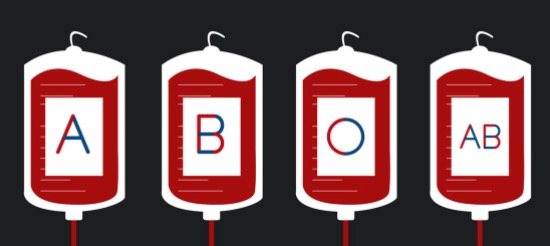
Though there is talk out there about whether having a noticeable blood-alcohol level can deter bed bugs from biting you. According to a University of Nebraska-Lincoln study, bed bugs do prefer alcohol-free blood.
(Though we wouldn’t recommend drinking consistently to avoid being bitten).
At the end of the day… You shouldn’t worry about how your blood type will affect your likelihood of being bitten and experiencing symptoms.
Though it is true that bed bugs might be attracted to certain people over others.
Even if it’s not likely due to blood type…
But instead, bed bugs might be more attracted to you because of the following:
- You sleep with a lot of skin exposed.
- You do not have body hair.
- You do not move around a lot while you sleep.
What Smell Attracts Bed Bugs?
First of all, we should note that cleaning chemicals do not attract or deter bed bugs.
From what we know, there is no evidence that suggests products you use regularly in your home….
Such as:
- Bleach
- Fabric softener
- Windex
- Scented candles
Would have any real effect in attracting these pests.
Bed bugs, however, are attracted to a chemical called histamine, according to Dr. Regine Greis.
(This doctor is famous for letting bed bugs bite her over 180,000 times).

Histamine will build up on the skin and feces of bed bugs to alert their friends of safe locations to come feed.
Researchers discovered that this is a common way that these insects communicate.
This pheromone often causes issues with infestations that are facing neglect. When not dealt with, the build-up of Histamine will cause the bed bug infestation to snowball.
Another question that is commonly asked regarding bed bugs and smell is…
Do Bed Bugs Like Perfume?
The short answer is no.
As mentioned above, there are no household products that will specifically attract bed bugs.
Therefore, strong scents such as perfume will have no effect on an existing or future bed bug infestation.
What Attracts Bed Bugs? (Myth or Fact)
Below are 5 things that are commonly discussed as attracting bed bugs, and we will debunk whether they indeed lure bed bugs into your home or not.
Are Bed Bugs Attracted to Wood?
This is a myth.

Bed bugs are famous for their ability to go unseen for long periods of time.
So, you might be concerned about whether bed bugs like to hide in wood.
Though these insects like to hide in cracks/crevices…
(Which could exist in wood).
They’re not going to especially seek it out.
Therefore, discarding wood furniture will have no effect on your home’s vulnerability to an infestation.
Are Bed Bugs Attracted to Period Blood?
This is a myth.

It’s embarrassing to think about this, but it’s common sense.
If bed bugs feed on blood…
Are you at greater risk of being bitten when on your period?
The key here is that it’s not the scent of blood that attracts bed bugs. It’s the CO2 and body heat from the host.
So the answer to this is no.
Bed bugs are not more attracted to someone on their period and they have no way to even sense that.
Does Urine Attract Bed Bugs?
This is a myth.
There is little evidence showing that urine will attract bed bugs.
Yet why is this a common misconception?
Here is the thought process:
- Urine is warm, which is an ideal temperature for bed bugs. Though it isn’t warm enough to the same level of body heat.
- Urine contains some carbon dioxide. Although the amount is so little it will have no effect on attracting bed bugs (Urine is over 90% water).
- Urine contains hormones. It does contain the hormone histamine, which bed bugs use to communicate. (so this one is still up for debate).
Are Bed Bugs Attracted to Household Chemicals?
This is a myth.
Though certain scents will attract bed bugs, those smells do not come from the cleaning chemicals in your closet.
Products commonly mentioned here include:
- Ammonia
- Bleach
- Laundry detergent
- Windex
- Dishwasher detergent
You can breathe easy knowing that none of these household chemicals will attract bed bugs.
Are Bed Bugs Attracted to Dark Bed Sheets?
This is a fact.
According to the Journal of Medical Entomology, researchers found that bed bugs are actually attracted to certain colors more than others.
In this study it concludes that the following colors can trigger bed bugs:
Top colors that attract bed bugs = Black, Brown, Red
Top colors that deter bed bugs = Yellow, White, Green
So when it comes to bedsheets, there are certain darker colors that may attract bed bugs.
Though keep in mind that simply changing the color of your sheets is not going to remove or prevent an infestation from happening.
Are Bed Bugs Are Attracted to Dirty Laundry?
This is a fact.
Pests like bed bugs are always looking for places to hide, and the perfect place could be a large pile of dirty clothes.
An experiment conducted by Dr. William Hentley from the University of Sheffield’s Department of Animal and Plant Sciences, suggests that leaving dirty clothes around sleeping areas could facilitate the growth of a bed bug infestation.
Scientists at the University of Sheffield discovered that in the absence of a human host, bed bugs are twice as likely to get together on bags containing dirty clothes than on bags containing fresh clothes.
Here is an infographic summary of the top myths and facts related to bed bugs. 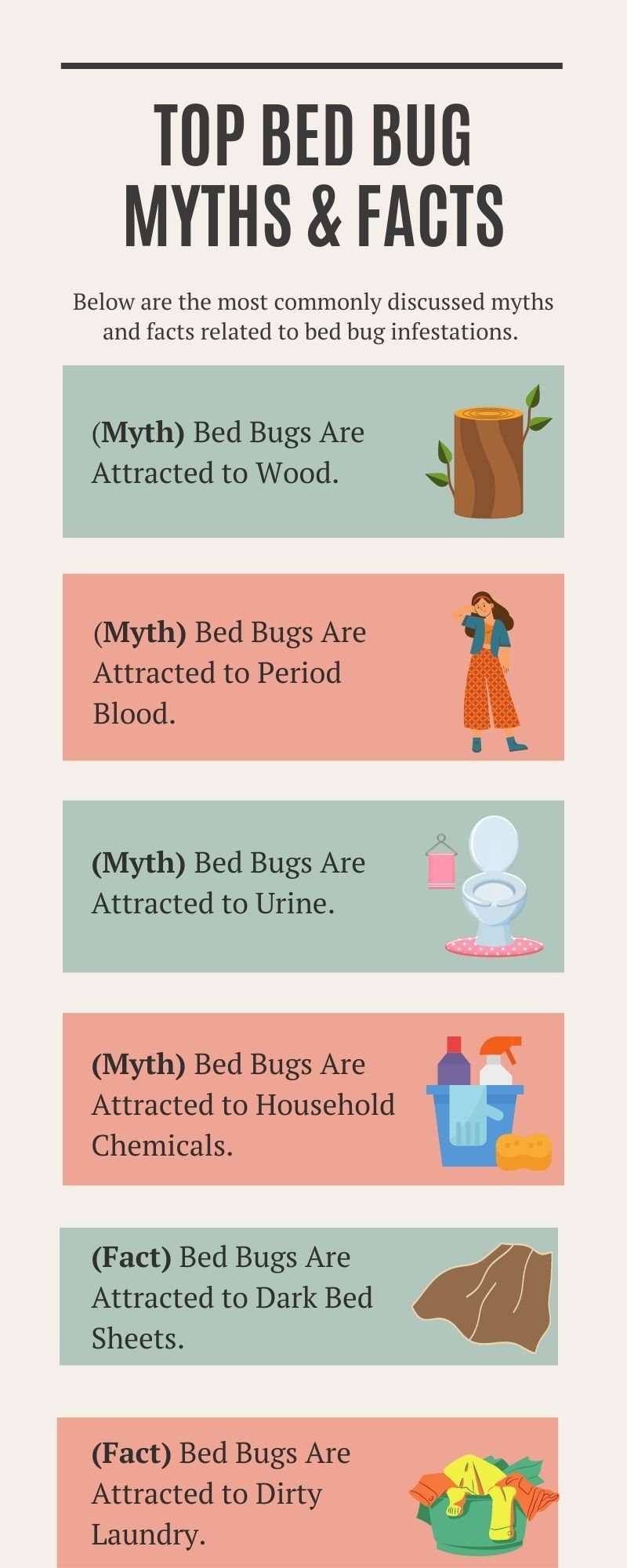
How to Make Bed Bugs Come out of Hiding?
Whether it be through DIY methods or professional treatment, you usually need to locate bed bugs before you can kill them.
Here are a few ways to make bed bugs come out of hiding:
- Be on the lookout at night – Take advantage of the time you know bed bugs are likely to surface and try and find the location of the nest.
- Use a Steamer – This won’t be hot enough to actually kill bed bugs, but it could be the ideal temperature to make them come out of hiding.
- Laundry – Wash any stored or untouched clothes on high heat. This will either kill or remove bed bugs from the clothes in which they were originally living.
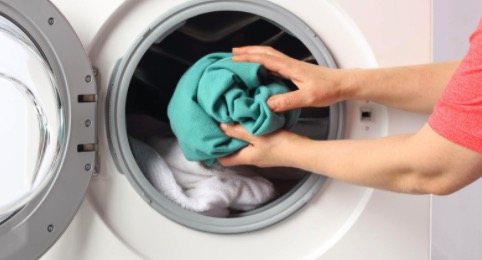
How To Prevent Your Residence from Attracting Bed Bugs
Simply put, bed bugs love to hitchhike to their new source of food.
While they can appear nearly anywhere, there are specific places you can find them.
Here are some tips to help avoid bringing bed bugs into the home:
1. Inspect for Bed Bugs When Staying at a Hotel
To reiterate…
It doesn’t matter how clean or organized your room is.
Whenever you stay at a hotel.
(or any temporary residence).
You should inspect these areas for bed bugs.
- The bed (sheets, box spring, bed frame).
- Along the walls/baseboards.
- In the closet.
- Behind/under furniture.
2. Check Seating on Public Transportation
When taking public transportation.
Keep an eye out for any signs of bed bugs.
You might spot evidence on busses through dark red or black spots.
Be safe on public transit and make sure to adhere to the appropriate safety tips.
The video below is a frightening example of what a BAD bed bug infestation looks like on a public bus.
3. Wash Guest Bedding
If you’re having guests stay at your home, they may bring bed bugs with them that could settle in and reproduce.
Female bed bugs can lay up to 12 eggs per day.
(Up to 500 eggs in their lifetimes!)
Particularly if they’ve stayed at other locations before visiting your home.
The best way to prevent the risk of an infestation in these instances is to bag up all of the sheets.
Then wash all of the used bedding and sheets at the hottest temperature setting following their departure.
Click here for more information on how you can get bed bugs from your neighbors.
4. Look for Bed Bugs Your Kids Might Bring in from Friends’ Houses
If your kids spend time at one of their friends’ houses, they may bring bed bugs home.

When your child returns, keep a lookout for any signs of bed bugs on their body or any belongings they bring back with them.
Do a quick inspection of their clothes when they get back home.
This could seem like overkill….
But bed bugs can have pretty harmful effects on children.
Such as:
- Permanent scarring
- Allergic reactions
- Anxiety
- Emotional damage
- And more.
5. Watch for Evidence from Work
There are instances where victims brought bed bugs home from work.
You may want to check for these insects on work clothing and make sure to regularly and thoroughly wash all clothing worn in the workplace.
6. Inspect Used Furniture

If you bring used furniture into the home,
whether from a second-hand store or from the side of the road..
Look closely for any signs of bed bugs such as:
- Black streaks
- Shed skins
- Dark brown bloodstains
There are instances where you can sue a used furniture store for allowing you to purchase furniture that was infested by bed bugs.
7. Look for Bed Bugs in Any Public Space
If you’re out somewhere that could house bed bugs..
Stay aware of the potential signs, including any shells, stains, or distinct almond smell they leave behind.
While you shouldn’t be paranoid of bed bugs…
Remaining vigilant and knowing what to look for when out or having guests can help you avoid infestations at home.
If you experienced bed bugs at your home, hotel, or apartment, get in touch with us to discuss whether you’re eligible for financial compensation.
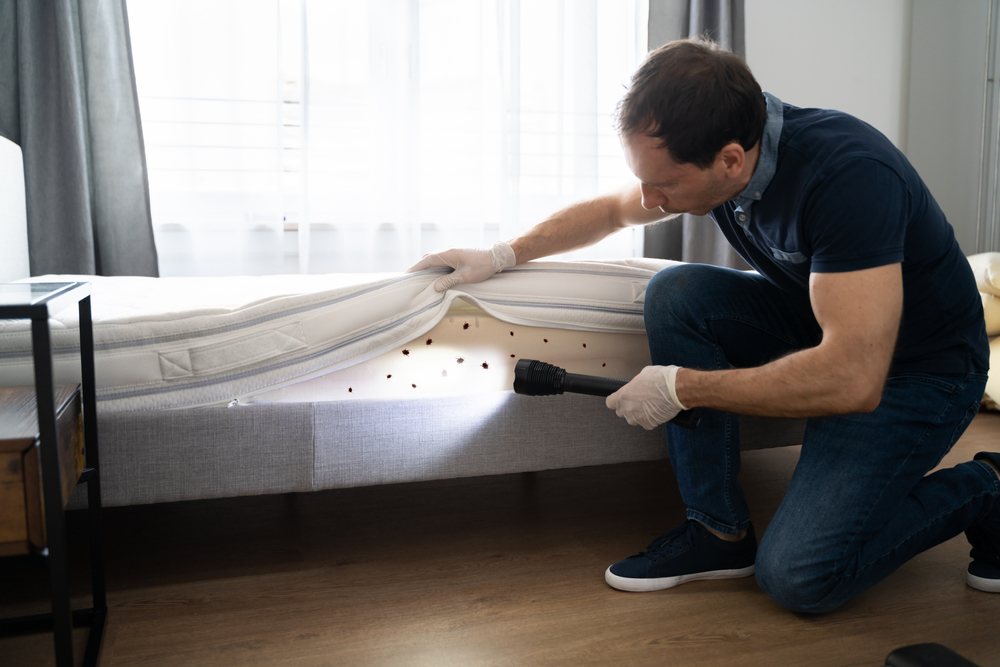


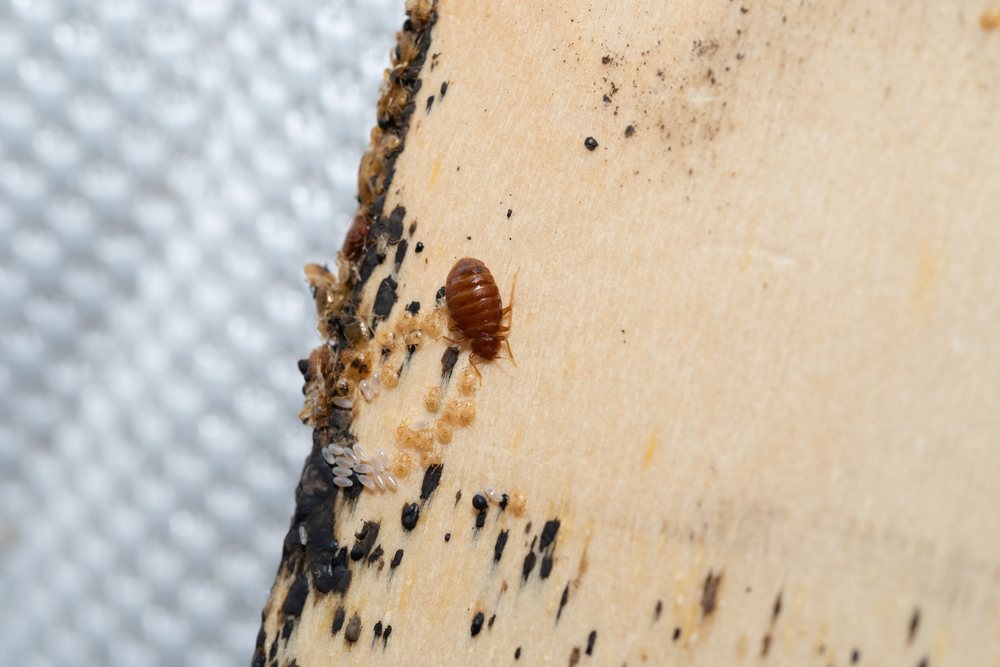
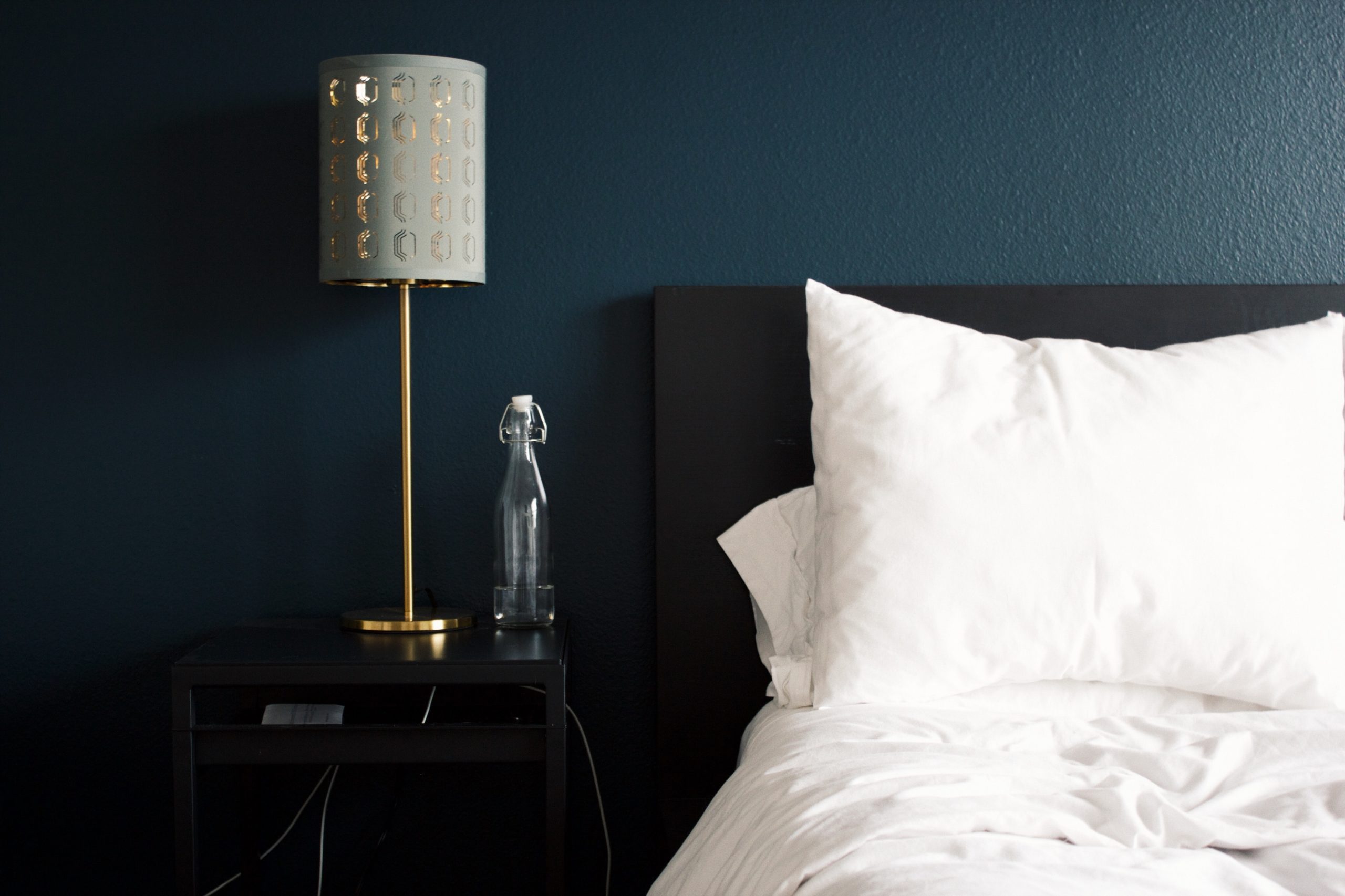


What if I suspect that a worker from a terminex treatment that sprayed for roaches planted bed bugs in my home? He stated “you will probably have bed bugs next”. Sure enough we now do.